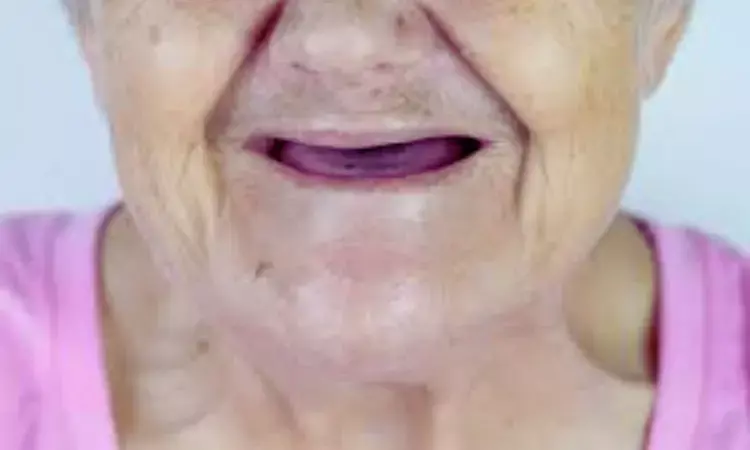- Home
- Medical news & Guidelines
- Anesthesiology
- Cardiology and CTVS
- Critical Care
- Dentistry
- Dermatology
- Diabetes and Endocrinology
- ENT
- Gastroenterology
- Medicine
- Nephrology
- Neurology
- Obstretics-Gynaecology
- Oncology
- Ophthalmology
- Orthopaedics
- Pediatrics-Neonatology
- Psychiatry
- Pulmonology
- Radiology
- Surgery
- Urology
- Laboratory Medicine
- Diet
- Nursing
- Paramedical
- Physiotherapy
- Health news
- Fact Check
- Bone Health Fact Check
- Brain Health Fact Check
- Cancer Related Fact Check
- Child Care Fact Check
- Dental and oral health fact check
- Diabetes and metabolic health fact check
- Diet and Nutrition Fact Check
- Eye and ENT Care Fact Check
- Fitness fact check
- Gut health fact check
- Heart health fact check
- Kidney health fact check
- Medical education fact check
- Men's health fact check
- Respiratory fact check
- Skin and hair care fact check
- Vaccine and Immunization fact check
- Women's health fact check
- AYUSH
- State News
- Andaman and Nicobar Islands
- Andhra Pradesh
- Arunachal Pradesh
- Assam
- Bihar
- Chandigarh
- Chattisgarh
- Dadra and Nagar Haveli
- Daman and Diu
- Delhi
- Goa
- Gujarat
- Haryana
- Himachal Pradesh
- Jammu & Kashmir
- Jharkhand
- Karnataka
- Kerala
- Ladakh
- Lakshadweep
- Madhya Pradesh
- Maharashtra
- Manipur
- Meghalaya
- Mizoram
- Nagaland
- Odisha
- Puducherry
- Punjab
- Rajasthan
- Sikkim
- Tamil Nadu
- Telangana
- Tripura
- Uttar Pradesh
- Uttrakhand
- West Bengal
- Medical Education
- Industry
Impaired Chewing Linked to Higher Mortality: Diet and Oral Health Interventions Key to Longevity, Study Reveals

China: A recent study highlights the intriguing connection between chewing capacity and overall mortality risk, emphasizing the broader implications of diet and ageing. The findings, published in the Journal of Clinical Periodontology suggest that individuals with impaired chewing capacity (ICC) may face a heightened risk of mortality, largely driven by poorer diet quality and accelerated ageing.
"Individuals with impaired chewing capacity were found to have a 28.9% higher risk of cardiovascular disease-related mortality and a 32.7% increased risk of cancer-related mortality," the researchers reported. These results indicate that strategies focusing on enhancing diet and oral health could be vital in promoting longevity.
Chewing, a fundamental aspect of oral health, is pivotal in breaking down food for optimal nutrient absorption. Difficulty chewing due to tooth loss may increase the risk of death, but the reasons behind this are still unclear. Considering this, Shaohua Ge, Shandong University & Shandong Provincial Clinical Research Center for Oral Diseases, Jinan, China, and colleagues aimed to understand how diet and ageing might influence the link between chewing ability and long-term survival.
For this purpose, the researchers analyzed data from 22,900 participants aged 20 and older from the National Health and Nutrition Examination Survey (NHANES 1999–2010). Mortality follow-up continued until December 31, 2019. Chewing capacity was measured by functional tooth units (FTUs). At the same time, diet quality was assessed using a 24-hour recall questionnaire and three dietary indices: Nutrition Index (NI), Energy-Adjusted Dietary Inflammatory Index (E-DII), and Healthy Eating Index-2015 (HEI-2015). Biological ageing was evaluated through phenotypic age acceleration (PhenoAgeAccel) and the frailty index.
Mediation analyses examined how diet quality influenced the link between FTUs and ageing, and how ageing impacted the relationship between impaired chewing capacity and mortality.
The following were the key findings of the study:
- Participants with more functional tooth units exhibited a slower biological ageing process.
- Diet quality scores mediated 9.0%–23.0% of the association between chewing capacity and biological ageing.
- Impaired chewing capacity was positively associated with all-cause mortality, with a hazard ratio of 1.282.
- ICC was linked to a 28.9% higher risk of cardiovascular disease mortality and a 32.7% higher risk of cancer mortality.
- Mediation analyses revealed that phenotypic age acceleration (PhenoAgeAccel) accounted for 18.1%, 17.3%, and 12.5% of the effect of ICC on all-cause, CVD, and cancer mortality, respectively.
- Similar mediation proportions were observed for the frailty index, ranging from 11.6% to 23.5%.
"The findings revealed that impaired chewing capacity was linked to lower diet quality and faster ageing, leading to a higher mortality risk. This suggests that improving diet and oral health could support healthy ageing and longevity, though more research is needed," the researchers concluded.
Reference:
Du, M., Deng, K., Yin, J., Wu, C., Hu, S., Guo, L., Luo, Z., Tonetti, M., Tjakkes, H. E., Visser, A., Ge, S., & Li, A. Association Between Chewing Capacity and Mortality Risk: The Role of Diet and Ageing. Journal of Clinical Periodontology. https://doi.org/10.1111/jcpe.14122
Dr Kamal Kant Kohli-MBBS, DTCD- a chest specialist with more than 30 years of practice and a flair for writing clinical articles, Dr Kamal Kant Kohli joined Medical Dialogues as a Chief Editor of Medical News. Besides writing articles, as an editor, he proofreads and verifies all the medical content published on Medical Dialogues including those coming from journals, studies,medical conferences,guidelines etc. Email: drkohli@medicaldialogues.in. Contact no. 011-43720751


